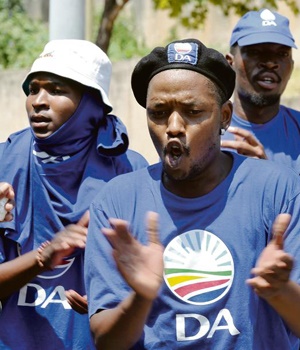
A survey of young people’s perceptions of their own power can help us understand their growing militance.
A Futurefact survey found that 45% of working class young students (between the ages of 18 and 25) felt that they had no power over their lives, which is significantly higher than those in the middle class (29%).
The disempowered percentage increases to 51% if the students are strong supporters of the Economic Freedom Fighters (EFF), though it must be said that any strong political-party affiliation tends to increase the sense of being disempowered, though supporters of other political parties don’t seem to feel it as strongly as those who support the EFF do.
There are many elements that show that there may well be political ferment at the heart of the unrest, with an EFF affiliation generally heralding more negative sentiment on several fronts. Anger levels are more palpable among young EFF students than others, with about four in 10 admitting to often feeling angry these days.
Nevertheless, the majority of young students, irrespective of party, believe black and white people in South Africa cannot prosper without each other – though young DA students are less likely to believe this (DA 57%, ANC 66% and EFF 62%).
It is also fascinating that 64% of young EFF students disagree that whites should still feel guilty about apartheid. It is no surprise, perhaps, that more than seven in 10 young DA students have this view, although it is interesting that only 40% of ANC supporters believe this.
Why are young DA students less conciliatory? Has the DA somehow been instrumental in cementing this view through its policies? Or is this a generation that is reluctant to take responsibility for the horrible things that happened in South Africa before they were born?
There is a perception among young students that whites still feel superior to black people (EFF 75%, ANC 66% and DA 45%). And, certainly, there is a perception that racism in this country is still bad or has become worse (EFF 67%, ANC 60% and DA 58%).
It seems likely that, at least to some extent, economic hardship is at the heart of the problem – 51% of young EFF students say they often have no money to pay their bills, compared with 41% of ANC supporters and 34% of DA supporters. There is a strong sense that government “has forgotten about people like me”, with 64% of EFF students feeling this strongly, compared with 53% of DA supporters and 55% of ANC supporters. Interestingly, this percentage goes up significantly to 72% if all EFF supporters are taken into account, rather than only those who are students.
Throughout the survey findings, it is clear that the working class is most likely to feel marginalised, disempowered and face tough economic situations. What is interesting, though, is that while more young EFF students are working class (28%), this isn’t much higher than for those supporting the ANC (24%), while the young DA student working class support base is 15%.
Where the big difference does come in, though, is that both young ANC and DA students are far more likely to be part of the upper middle class or even the upper class – though there seems to be more reticence among DA students to acknowledge this. This disparity may well be significant when considering the level of anger that is evident on campuses.
One of the key findings is that both EFF and ANC young student groups believe the degree of racism has diminished since Nelson Mandela’s presidency, while those in the young DA student group feel it has increased.
. The findings presented above are from a Futurefact survey conducted late last year, based on a probability sample of 3 015 adults aged 18 and older who live in communities of more than 500 people throughout South Africa, and represent 22 8 million adults living in 9.4 million households
. If you would like to find out more about Futurefact and its extensive attitudinal databases, contact Jos Kuper on 082 904 9939, or visit futurefact.co.za
The majority of young students, irrespective of party, believe black and white people in SA can’t prosper without each other
DA STUDENTS
57%
ANC STUDENTS
66%
EFF STUDENTS
62%
Has the degree of racism in SA diminished since Nelson Mandela’s presidency?
SMS us on 35697 using the keyword FUTURE and tell us what you think. Please include your name and province. SMSes cost R1.50




 Publications
Publications
 Partners
Partners








